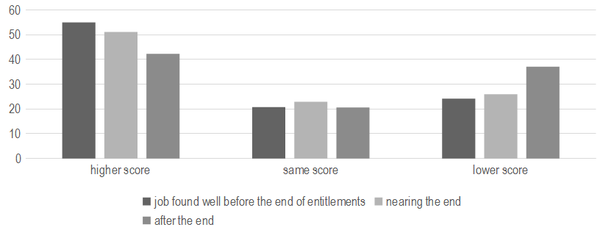Economie et Statistique / Economics and Statistics n° 503-504 - 2018 Expiry of Unemployment Benefits: What Impact on Post-Unemployment Job Satisfaction?
THE ARTICLE ON ONE PAGE
Key question
A number of empirical studies conducted both in France and abroad have observed a surge in finding jobs as people come towards the end of unemployment benefit entitlements. This may be interpreted as a manifestation of the increasing intensity of job searches as they near the end of their entitlements, or as the fact that unemployed people resign themselves to accepting jobs that they would not have taken during the benefits entitlement period. Does job satisfaction differ according to whether a job was found before or after the expiry of benefit entitlements?
Methodology
This analysis exploits the discontinuity created by the end of unemployment benefit entitlements by comparing job satisfaction depending on whether the job was found just before (in the one-and-a-half month) or just after the end of entitlements. It is based on the Parcours des demandeurs d’emploi indemnisés survey, conducted in 2013 by Pôle emploi among job-seekers registered from July 2012 to February 2013 and receiving unemployment benefits. The analysis is mainly based on the estimation of a panel data fixed effects linear regression model (within model).
Main results
- Elements other than wage and stability contribute to job satisfaction, intrinsic value in particular;
- Job-seekers are less satisfied with the jobs found after their entitlements end rather than a long time before they end;
- The characteristics of jobs found before and after the expiry of entitlements differ: jobs found after this expiry are less well paid and often shorter-lived than those found nearing the end of entitlements. For given wage level and stability, they are also scored far lower, are considered to be less interesting and often represent a demotion for the respondent;
- Satisfaction with jobs found near the end of entitlements seems to depend on the drop of consumption expenditures experienced during the period of unemployment: jobs tend to be scored lower when this drop was high.
graphiqueScore of the Job Found According to the Time of Return to Work Relative to Benefit Entitlements Expiry

Message
Satisfaction with jobs found after the end of entitlements is lower than with those found beforehand; for jobs found near the expiry of entitlements, it is lower if unemployment has significantly reduced consumer spending. These results, however, can only be interpreted as correlations and not as causal relationships. They do not enable us to state that an increase in the maximum duration of benefits would lead to an increase in satisfaction with post-unemployment jobs.
Article on one page (pdf, 34 Ko )


